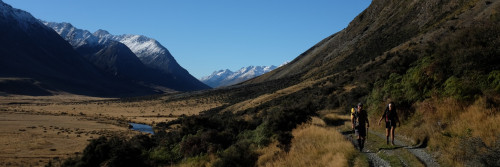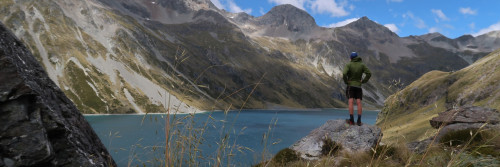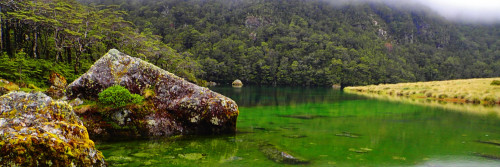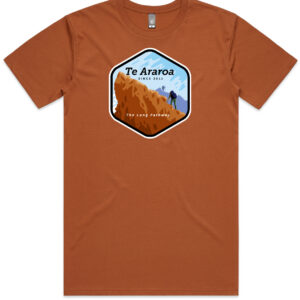News and media
The Communal Kingdom
Geoff Chapple explores a New Zealand geography.
New Zealanders it's commonly said, are an outdoors people, and it's certainly hard to think of any race - short perhaps of those still living semi-wild in harsh conditions like the Bedouin or the tribes of Papua New Guinea - that's more attuned to the natural world.
Given that we have supermarkets and the Warehouse now even in our medium-size towns, given that television repeaters and cellphone towers stand on the hills, and that we've at last achieved gridlock in Auckland - given that is, all the trappings of western civilisation - we remain still a nation of trampers, and hunters, campers and beach-goers, fishers and sailors. Even back in the cities, the walkers, the joggers, the cyclists and the skateboarders are out and about on every street.
In that out-of-doors sense, we don't possess the land but are possessed by it, and it's easy to see the New Zealand topography as an historical agent in its own right. It's a long, sea-girt and rugged land, with few people, and the effect is pronounced. Right from the start: anyone who has listened to the mihi and watched the beat of a hand mark out the boundaries by way of mountain and river will know what I mean - Ko Taupiri te maunga, Ko Waikato te awa . . . . . There's a bit of think big in there, and quite right. When the settlers arrived, something like 130,000 people were filling a space the size of - well, the size of New Zealand.
That sense of being part of something larger than your rented flat, or subdivided section has stayed on. The character of a nation is, like any child, moulded by the early years. That first Governor - Hobson was it ? Easy as you go William, for the Governor and his legislative council nearly strangled us at birth with an 1842 Ordinance that eliminated any public access strip above high tide on sales of coastal land. Happily, Queen Victoria - or so they say, but one suspects some closet Chartist in the Colonial Office acting in the Queen's name - disallowed that law and installed the first, famous, 100-foot strip, the Queen's Chain. Provincial surveyors - reinforced no doubt by the settlers who'd been shut out of the private waterways and game rights of the English estates - took that first hint, and extended the public strip inland, along the waterways.
That set up the entrances to a communal kingdom, and it grew. Now, if you include the lake surfaces, some 30 per cent of this country is public domain, and there's more than that accessible provided you seek farmer permission, traditionally given in this country. The pastoral leases open up that way, the clifftops too. It's all part of the kingdom. Few people live in these places, and plenty don't even visit, but it's sunk into the nation's character. When you're in New Zealand, you're in New Zealand, as they say, all day long. There's something tangible in the air that you don't find in any other part of the globe. On the back decks of the houses, it's relaxation, and beer and meat-smoke. On the beaches it's the right to be lazy, to dress down in floppy hats, faded shirts, tattered shorts, and jandals or bare feet. Behind it all - template to these smaller kingdoms of BBQ or Scunge - is the Communal Kingdom.
And amidst that, still just 4 million people. They're not particularly defined by class, but there's a spectrum of sorts. It starts with the hunter-gatherers and poachers dotted along the western coast. Then come the workers on farms and in the cities, with a boisterous culture that mounts to a wall of noise every Friday in the pubs, and attracts intermittent interference from the police Then the farmers - knowledgeable about machines, and crops and the pedigree of animals, their isolation in the valleys of the north or on the South Island high country making them often courtly people, running fiefdoms of a kind, with their own laws. Onward to the professional middle classes, city-dwellers mainly, skilled at their jobs, seriously knowledgeable about this country's history, ecology, geology, its birds and reptiles and insects and bush, book-readers all, and their flashier middle class cousins in the shiny 4WD's driven often by coiffed professional women, about whom I profess to know nothing. Right at the top, the genuinely wealthy, who may have emerged from the working class, the landowning class, or the middle class, and whose departures for obscure regions of the world, like Lake Geneva, sometimes make the press.
It's a mix that together comprises a diverse New Zealand culture, but it has certain things in common. Patriotism. Sport. A natural equality that reaches often across the lines, or delves downward into the repositories of practical skill and earthy humour and the stories of struggle more than it ever aspires upward, to wealth.
Allied to that are certain shared antagonisms. Australia of course, but also any hint that private money, and particularly money from off-shore, should buy or develop for profit anything we attribute to the communal kingdom. Take the American Glenn Schaeffer. Schaeffer's share options and executive status with the Mandalay Resort Group in Las Vegas, have made him a rich man, able to hang out in Nelson three weeks a year, and one has to call him a generous visitor - a benefactor of the Suter Gallery, and founder of a biennial $60,000 literary grant progamme.
But interviewed by the Los Angeles Times last October (2003) for a piece about Californians moving to New Zealand, Schaeffer confessed to an "impulse" to develop New Zealand coastline.
"That coastline basically feeds animals," Schaeffer told the LA Times. "Well, those animals don't need to look at the ocean they eat grass. If they put houses on those cliffs, there are fortunes to be made."
This is not a crowd-pleaser. The Nelson Mail re-cycled the quote, and it had the right combination of referential truth and shut-out horror to become instant folklore round the country.
The differences between nation and nation are founded on real differences of outlook, and hey - every American wants to be a millionaire and that's a great tip from Glenn. He made a bundle on the strip, and he's right about those goddam sheeps.
But that's them, and this is us. We're on that cliff, there's not a house in sight, and we're with the animals. We're propped on that headland with a gingham picnic cloth and a sunhat and our gaze out over the ocean is just as blank, our jaw masticating the lunch just as slow as any of the surrounding sea-gazing ruminants. Then we're off down the hill, past the mangemange, wading through the hot and scented air that's held to knee-height by the long grasses, we're pushing through the flax, and we're headed for the surf. It's New Zealand, Glenn.



